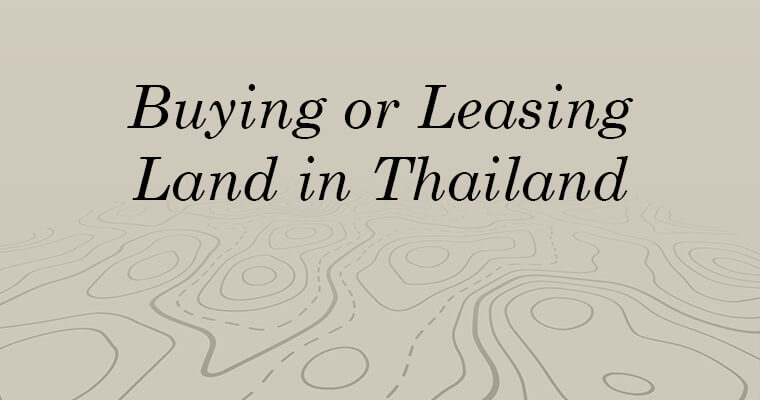For foreigners interested in building a home, launching a business, or investing in a development, the idea of buying land in Phuket is extremely attractive. But Phuket’s land ownership laws are complex, especially for non-Thai nationals, so understanding the legal framework is essential before moving forward.
This guide explains the key differences between buying and leasing land in Phuket, and how to navigate the local regulations legally and safely.
Can Foreigners Own Land in Phuket?
Under Thai law, foreigners are not allowed to own freehold land directly. This applies across the country, including Phuket, and is rooted in Thailand’s land code, which prioritises Thai citizens and entities.
However, there are legal workarounds that allow foreigners to control land in practice, either through leasehold or indirect ownership structures. These are commonly and legally used across Phuket.
Option 1: Leasing Land in Phuket
Leasing land is the most straightforward and secure method for foreigners who want to build or use property long-term.
Key facts:
-
Lease terms can be up to 30 years, with renewal clauses often allowing extensions (e.g., 30+30+30 years).
-
Lease contracts should be registered at the Land Office to be legally enforceable.
-
You may lease land to build a villa, operate a business, or hold it as an investment.
-
You can also lease land that already has a structure built on it (e.g., a house or villa).
Phuket has a large number of leasehold villas and private estates, especially in popular areas like Rawai, Nai Harn, Bang Tao, and Cherng Talay. If drafted properly, lease agreements are stable and protect your rights as a long-term occupant or investor.
Option 2: Buying Land Through a Thai Company
Another common structure is purchasing land via a Thai-registered company, where the land is owned by the company, and you (the foreigner) are the main shareholder and director.
This method:
-
Is legally permitted but must be set up properly with genuine Thai shareholders.
-
Requires ongoing accounting, compliance, and tax filing.
-
Is best suited for business or development use, not casual home ownership.
Nominee shareholding by Thai nationals on behalf of a foreigner, where the Thai is simply a front and the foreigner is the true owner, is illegal under the Land Code (Section 96) and the Foreign Business Act B.E. 2542.
If such a structure is discovered, the land may be confiscated, the company stripped of its Thai-company status and both the Thai nominee and the foreigner may face legal penalties.
Buyers should assume that any Thai shareholder who does not genuinely participate or make a real capital contribution is acting as a nominee, and should avoid relying on such structures at all.
Option 3: Land Ownership via Thai Spouse
If you’re married to a Thai national, you may be able to register land in their name. However:
-
The foreign spouse must sign a declaration confirming no claim to the land.
-
The land will be considered personal property of the Thai spouse, not joint marital property.
This is not ideal for investment unless there is deep trust and clear legal protections in place.
Option 4: Long-Term Lease + Superficies or Usufruct
In Phuket, some developers or legal advisors offer land control structures that include:
-
A long-term lease, giving you rights to occupy the land
-
A superficies agreement, giving you the right to build and own the structure on it
-
Or a usufruct, granting temporary use rights during your lifetime
These are often used when building a villa on leased land, giving the buyer ownership of the house but not the land beneath it.
Due Diligence Is Everything
Before you lease or purchase any land in Phuket:
-
Engage a reputable property lawyer in Phuket
-
Perform a title deed search (look for Chanote titles)
-
Ensure the land has clear access, zoning approval, and utility connections
-
Register lease agreements at the Land Office
This ensures your investment is protected and legally enforceable.
Thinking of Buying or Leasing Land in Phuket?
Whether you’re looking to build a dream villa, start a property development, or make a long-term land investment in Phuket, our expert team will help you find the best land opportunities and navigate the legal process with confidence.
Disclaimer: The information contained in this article is provided for general informational purposes only and does not constitute legal, financial, or investment advice. While every effort has been made to ensure accuracy at the time of publication, property laws and regulations in Thailand are subject to change. Readers should always seek independent legal advice from a qualified Thai lawyer before making any property-related decision or transaction.


Social Contact